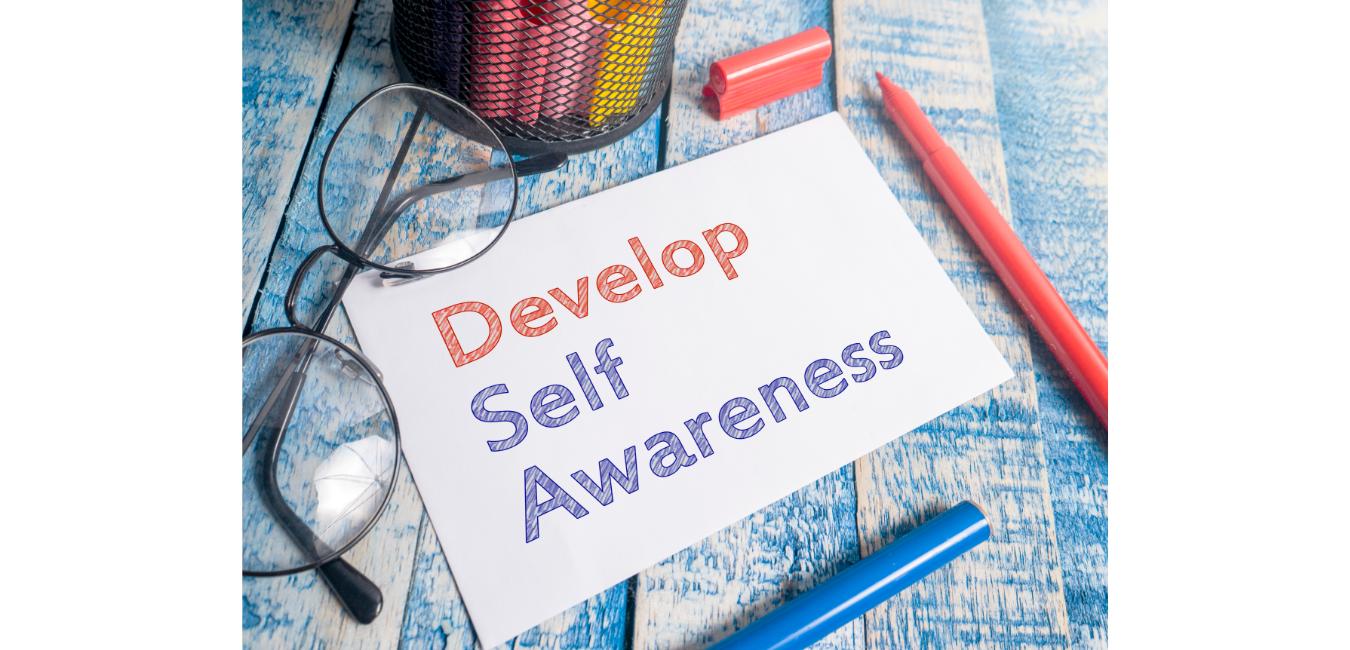Self-awareness is our ability to monitor our internal world and regulate our responses. Our emotions and physical sensations act as indicators of our mood or needs. These signals may be in response to external factors (e.g., other people or scenarios, etc.) or internal influences (e.g., thoughts, hunger, etc.). Self-awareness also allows us to self-reflect, learn from our past, and show ourselves compassion. This skill isn’t always innate. If we aren’t raised to be self-aware, or don’t actively practice in adulthood, it may be limited. Fortunately, it’s never too late to learn about ourselves. Below are some tips on how to be more self-aware.
Assessing Personality
There are many ways we can assess our own personality, including:
- Write a list of 10 self-descriptive adjectives (e.g., funny, shy, outgoing, apathetic, etc.). This helps us understand how we view ourselves.
- We can think about our greatest strengths and weaknesses. Knowing what we’re good at bolsters self-confidence. Knowing what we struggle with helps us pinpoint things to improve, or at least acknowledge.
- We can write a gratitude letter to ourselves. In it, we can include the things we admire about ourselves. This helps us build self-esteem and makes us consider our attributes in an appreciative light.
- Take a personality test, plenty of which are available online. These self-assessments may provide new personal insights or confirm what we already suspect. Such confirmation may help us decide which life path to pursue. It may also provide us with perspective about our emotions, reactions, and general outlook.
Body Scan Grounding Practice
The purpose of a body scan is to become aware of physical sensations. By focusing on our body, we become grounded in the present moment. This can be useful for helping us learn to identify physical symptoms of emotional triggers. For example, our ears may get hot when we’re angry. If we know this, we can heed the warning sign. The next time we’re upset we can listen to our body. Instead of lashing out, we can choose to take a breather until the physical and emotional symptoms subside. How to body scan:
- Sit comfortably (crossed-legged on the floor, or in a chair), feet pressed gently against the floor.
- Close the eyes.
- Start the scan at the top of the head.
- Notice how the head feels. Do not try to change it, simply observe.
- Move down the face, noticing how the eyes, ears, nose, and mouth feel.
- Repeat this process, moving from the upper body down to the feet.
Self-Awareness Journaling
Daily journaling can help us discover things about ourselves, past, present, and future. Writing down our thoughts, feelings and desires can make us feel vulnerable. The benefit is that journaling is a private practice that allows us to be totally honest. If we write daily, we may notice a common theme. This may help highlight important aspects of ourselves. We can write stream of consciousness entries, or give ourselves writing prompts about specific topics, like:
- What brings us happiness?
- Scary moments in our lives.
- What would we tell our teenaged self?
- Who do we owe an apology to?
- What do we value most in friends and family?
- Analysis of daily habits.
- Our current mood.
Investigate Triggers
“Trigger warning” is a widely popular phrase, and for good reason. We all have triggers and it’s useful to be aware of them. A trigger is something that provokes a specific emotional response, typically a difficult one. Awareness of triggers helps us take responsibility for our feelings. We can learn how to handle them, instead of allowing them to control us. When we experience an unpleasant emotional response, we can ask ourselves:
- What triggered the emotional response?
- Why was the situation triggering?
- How did we react to the trigger?
- What actions can we take to maintain control of our emotions the next time the trigger occurs?
Identify Life Goals
Most of us have goals, regardless of if they’re fully fleshed out. Goals motivate us, help us feel a sense of gratification, and give us purpose. They help us understand our individual wants and needs. However, sometimes we lack clear direction, or haven’t considered our aspirations. That’s okay. The pursuit of goals is a learnable skill. Identifying them helps build self awareness; setting goals allows us to clarify what we desire, who we aim to be, and how to get there.
Answer each question below in written form. That way, we can review the document as we progress towards our goals.
- Write down three life goals. Pick the one that stands out.
- How will this goal be fulfilling and provide a sense of purpose?
- Which knowledge and skills are required to achieve it?
- What do we already possess that could help us?
- What roadblocks may we encounter when pursuing this goal?
- Who will support us?
Increasing self-awareness requires that we investigate ourselves from a curious, objective perspective. It helps us regulate our emotions, and practice self-reflection. It also ensures that we constructively direct our effort to worthwhile pursuits. So, practice self awareness and take control of life!
Sources
https://www.psychologytoday.com/ca/blog/the-gen-y-psy/201810/how-spot-your-emotional-triggers
https://www.psychpoint.com/mental-health/worksheets/setting-life-goals/
https://positivepsychology.com/self-awareness-exercises-activities-test/

